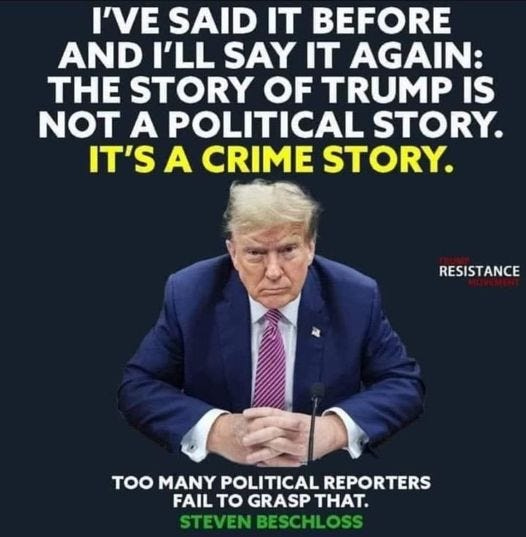“The story of Trump is not a political story. It’s a crime story.”
How Many Crimes Has Donald Trump Committed in Plain Sight?

From asking Russia to release emails to inciting an insurrection, Trump’s list of public offenses continues to grow.
Donald Trump has been publicly associated with several actions that have raised serious legal and ethical questions, many of which have unfolded in plain sight and sparked widespread controversy.
Here are some notable examples where his conduct has been perceived as crossing legal or ethical lines:
1. Asking Russia to Release Hillary Clinton’s Emails (2016)
During the 2016 presidential campaign, Trump publicly called on Russia to find and release emails that were allegedly deleted from Hillary Clinton’s private email server. At a press conference on July 27, 2016, he stated, “Russia, if you’re listening, I hope you’re able to find the 30,000 emails that are missing.” This statement raised alarms, as it appeared to solicit foreign interference in a U.S. election. Special Counsel Robert Mueller’s investigation into Russian interference in the 2016 election highlighted this event, but it did not result in any criminal charges against Trump himself.
2. Obstruction of Justice (Firing of FBI Director James Comey, 2017)
In May 2017, Trump fired FBI Director James Comey, who was leading an investigation into Russian interference in the 2016 election and possible ties to Trump’s campaign. Trump later admitted in a television interview that the Russia investigation was on his mind when he decided to dismiss Comey, which many interpreted as an attempt to obstruct justice. The Mueller Report documented multiple instances where Trump may have attempted to obstruct justice, though it ultimately did not conclude whether his actions amounted to a prosecutable offense due to Department of Justice policy against indicting a sitting president.
3. Allegations of Campaign Finance Violations (Hush Money Payments, 2016)
Trump was implicated in a scheme to pay hush money to adult film star Stormy Daniels and former Playboy model Karen McDougal during the 2016 presidential campaign to prevent them from discussing alleged affairs. Trump’s former lawyer, Michael Cohen, testified under oath that he made the payments at Trump’s direction to influence the outcome of the election, which could constitute a violation of federal campaign finance laws.
4. Attempt to Undermine the Results of the 2020 Election
Following his defeat in the 2020 presidential election, Trump publicly and repeatedly made false claims of widespread voter fraud and attempted to overturn the results. This effort included a now-infamous phone call on January 2, 2021, to Georgia Secretary of State Brad Raffensperger, in which Trump urged Raffensperger to “find 11,780 votes” — the exact number needed to overturn Joe Biden’s victory in Georgia. This action is currently under investigation as a potential violation of state and federal election laws.
5. Incitement of Insurrection (January 6, 2021 Capitol Attack)
On January 6, 2021, Trump held a rally where he urged his supporters to “fight like hell” and march to the U.S. Capitol to protest the certification of the 2020 electoral results. This led to a violent insurrection at the Capitol, resulting in multiple deaths and widespread damage. The House of Representatives impeached Trump for incitement of insurrection, making him the first president in U.S. history to be impeached twice. However, the Senate acquitted him, with a minority of Republican senators voting to convict.
6. Retention of Classified Documents (2022)
After leaving office, Trump took numerous classified documents with him to his Mar-a-Lago residence, leading to an FBI search and the recovery of hundreds of documents marked as classified. This act has raised questions about potential violations of the Presidential Records Act, mishandling of classified information, and obstruction of justice. The Department of Justice is currently investigating this matter.
7. Possible Violations of the Emoluments Clause
Throughout his presidency, Trump faced allegations of violating the Constitution’s Emoluments Clause, which prohibits federal officeholders from receiving gifts or payments from foreign governments. Critics argued that his continued ownership of businesses, including the Trump International Hotel in Washington, D.C., allowed him to profit from foreign officials staying at his properties, potentially violating this constitutional provision. Several lawsuits were filed, but they were ultimately dismissed on procedural grounds without reaching the substantive constitutional questions.
8. Interfering in the 2020 Election Certification Process
During the weeks leading up to and following the 2020 election, Trump repeatedly pressured state officials and members of Congress to overturn the election results. In addition to his call to Georgia officials, he publicly lobbied Vice President Mike Pence to refuse to certify the electoral college results, which Pence ultimately declined to do. These actions were part of a broader strategy to undermine the democratic process and have been cited in ongoing legal investigations.
Conclusion
These are just some of the notable actions Trump taken in plain sight of the American people that have drawn allegations of legal or ethical violations, many of which unfolded in public view. Whether these actions ultimately constitute crimes is a matter for courts and ongoing investigations to determine, but they have undoubtedly sparked significant legal, political, and public scrutiny.

